7 Step Keyword Research Checklist Guide
Keyword research checklist guide. Yup, that’s right we have a giveaway. Why because it will help you if you want to do your own keyword research.
Today we’re talking keyword research: why and how to do it.
If you don’t know we get together every Thursday and have a live video chat up about some amazing marketing topic ( just in case you were wondering). Today we’re digging into one of the SEO fundamentals, keyword research.
If you’d like a step by step walkthrough on how to do keyword research (without spending any money) this one is for you.
What Are Keywords? & Why Use Them?
Those are the 1st two questions to answer, right!?
Question 1: What are Keywords
Keywords are strings of words you type into Google. keywords should really be called keyword phrases to make it easier for everyone to understand. The phrases (or keywords) you pick are based upon what you think people are searching for to find businesses like yours on Google. Does that make sense? I hope so and if it doesn’t don’t worry it will in time.
How do you know what people are searching for online? Do you just guess? No! You need to do keyword research.
Question 2: Why Use Keywords
Each page/post on your website should have a dedicated phrase (keyword) that you are trying to rank for in Google. There are millions of combinations of words typed into Google each day. Google sees at least 80% of all searches. and (just an aside) did you know 15% of all searches daily are new phrases that have never been typed into Google? Imagine all the searches that happen each day. Imagine all the choices.
Now imagine having the wrong keywords on your website or no dedicated keyword strings on each individual page/post on your website. How will Google rank you? How will people find you? You can and do hurt how your business shows up online if you do nothing. Nothing is technically as bad as doing the wrong thing in my humble opinion. Do you ever wonder why people don’t contact you on your website? but others seem to get contacted on theirs? This could be this reason.
Proper keyword research and implementation are what we do to help maximize a businesses’ chance of getting found online. Keyword research is fundamental to any search engine optimization strategy. Along with this, keyword research can help with all your online marketing making it more cohesive strategic.
Keyword Research Checklist Guide
An SEO professional can figure out which keywords will be the best ones for you to use on your website and they’ll also be able to show you why.
So, now that we know some of the basics. let’s get into it.
If you’re doing this yourself or if you’ve hired someone to do it for you know the end result always the same: You have a well-researched list of keywords (phrases) to put on your website.
This is the beginning of your search engine optimization. This is how you will found when the ‘right customer’ is searching for you.
Below is a step by step, how to do your own keyword research. Along with this, there is a downloadable checklist guide. Yes, a guide because it is a bit more than a checklist. Plus, the guide as some additional tips/hacks you won’t find in this article if you want a bit dive a dive. Let’s get to it. The video above goes into some of these steps as well.
Step 1: Brainstorming
Brainstorming is always the best place to start, it’s simple and fun. Grab that pen and paper and meet me back here…Ok, now write down everything you’d search for to find your business or businesses like yours.
Then write down everything you think your customers would search for. Next, write down what your wife or husband might search. If someone else is around, ask them ‘what they would search for to find your business and write what they say down.
Next, write down all your products or services. Do you carry brand names? write those down too. This is fun right. It does or can take some time but once you have this list you can keep it and refer back to it. I’d give yourself about half an hour. Remember this is just the beginning. Keyword research is a process. I guess I should mention here that keyword research does take some time to get done so you should plan on revisiting this process. You could just jump ahead once you have a small list but eventually, you’ll want to dig deeper. Needless to say, keyword research is an ongoing thing.
Okay, on to the next step. The next step is really fun.
Step 2: SERPs (Search Engine Results Page)
Search engine results pages (SERPs). We’re going to use the search engine results pages or SERPs, as we like to call them, to help us find additional keyword strings (keywords) that we know people are searching in Google. Google knows a lot, so Google can tell us a lot if we just know how to look.
Below is a SERP where you see the ‘people also ask’ section. Knowing what other people ask it super helpful and maybe we could document these keyword strings and use them or at the very least we could make sure we answer these questions in our content as we know it will help our customers/clients get the answers they could be looking for.

You can also play with Google autofill functionality. This is really fun to do as well, and it will help you find a variety of keyword strings that you know people are using. Start typing the things you think people would search to find a business like yours. Write down all the auto-suggest phrases that would be suitable for your business.
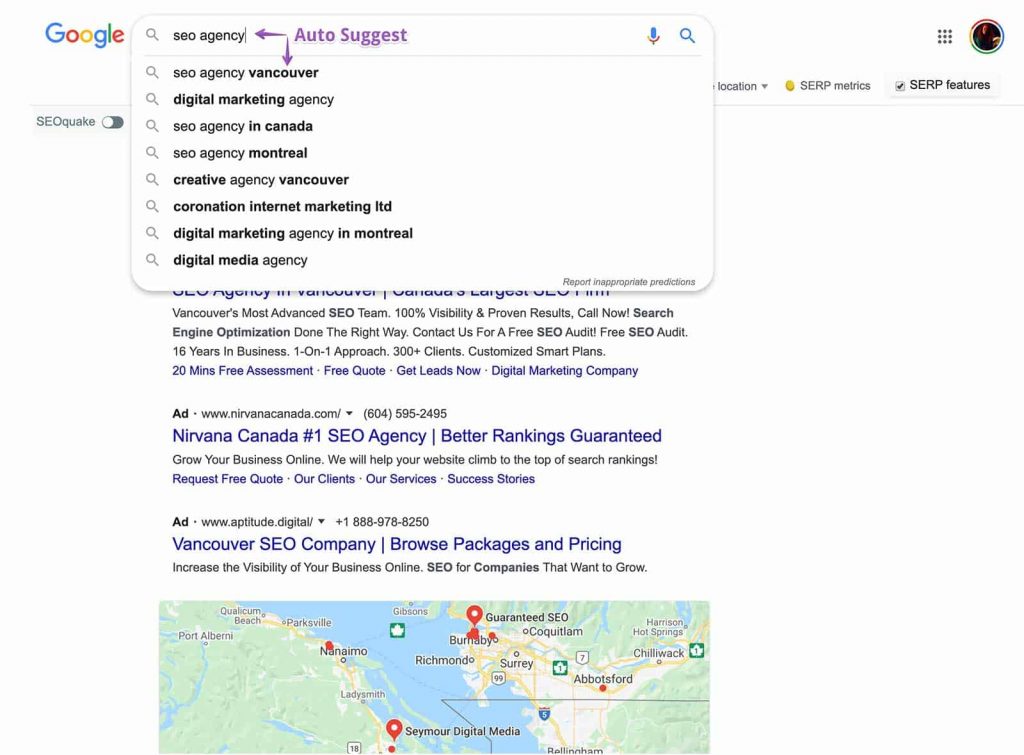
What we are doing here is finding long-tail (lower search volume) keywords to use in our content. These types of keywords usually have lower competition but over time will bring you highly relevant traffic. We’ll get more into that later when we get to the keyword planner.
Write down all the keyword strings that could work. We’re making a long list.
Remember to save this list somewhere where you can visit it, update it and keep track of what keywords you’re using. Now you probably have a lot of keywords on that list.
You can go down a rabbit hole with keyword research. know that! It never hurts to dig deeper and deeper. If you’re just starting out maybe this is the best place to stop. However, you should know, there are some additional tools you can use to gather even more keyword phrase options.
Along with this, you can also learn or have your SEO person help you discover what keywords your competition is using. This comes down to learning how to look the right way. Keyword research is a big topic and it can take a lot of work. It is fundamental to succeeding online. With a good SEO strategy and specifically a systematic approach to the keyword research, you can learn grow and reach new customers online.
Step 3: Keyword Research Third-Party Tools.
Many SEO’s use 3rd party tools and there are a lot of them. Some are free, some have free portions (freemium model). I would say that the best tools are always Google tools but I wanted to mentions so great ones many in the industry use. I have heard that Ubersuggest shows you more variations of keywords than any other tool including Google keyword planner.
Keyword Research Tools
- Google search console (free Google tool)
- SERPs (Search Engine Results Pages) (Free tool)
- Google Business Keywords (free Google tool)
- Google Trends (Free Google tool)
- Getting started Keyword Planner (free Google tool)
- Youtube insights if you got them (free tool, coming soon)
- People also ask (Free and paid version)
Let’s dig into a couple of these tools. I of course, always think Google first as they are free and probably has the most accurate.
Step 4: Search Console (hot tip)
Search Console is a free Google tool. All you need for it to work is a website. If you don’t have search console setup you can get it set up pretty easily. You’ll need to set it up before you move forward if you don’t have it setup. Of course, if you need help here reach out.
This is what the home page of search console looks like.
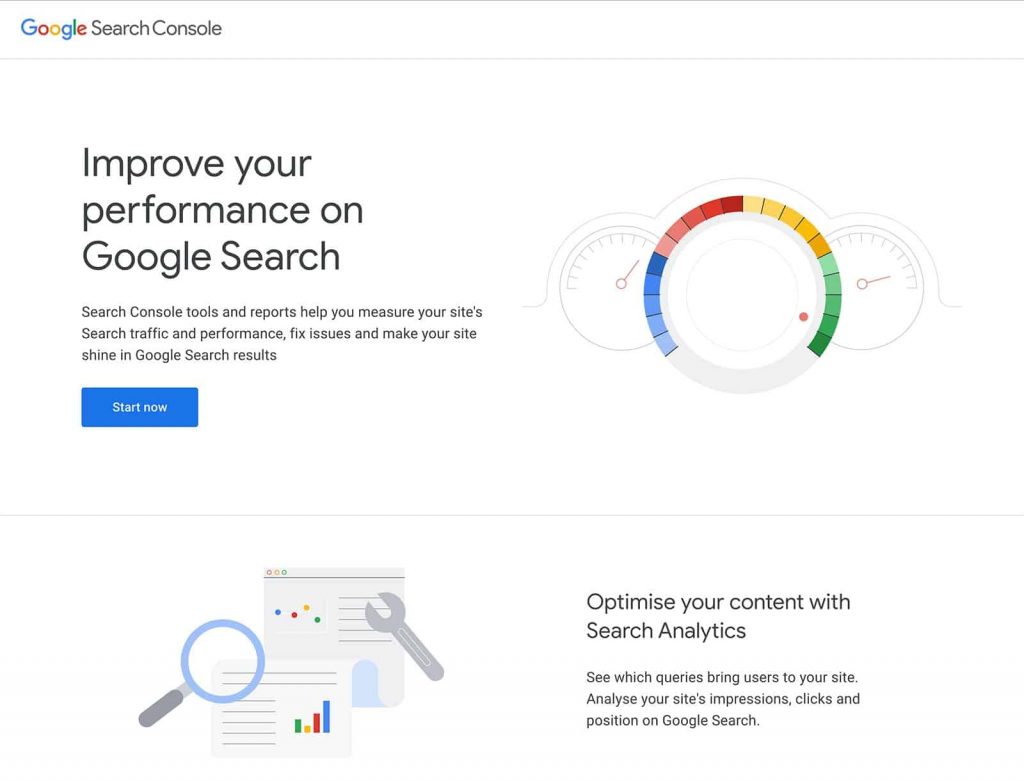
Now that you have search console. Head over to your query report. You’ll have at least 16 months of data.
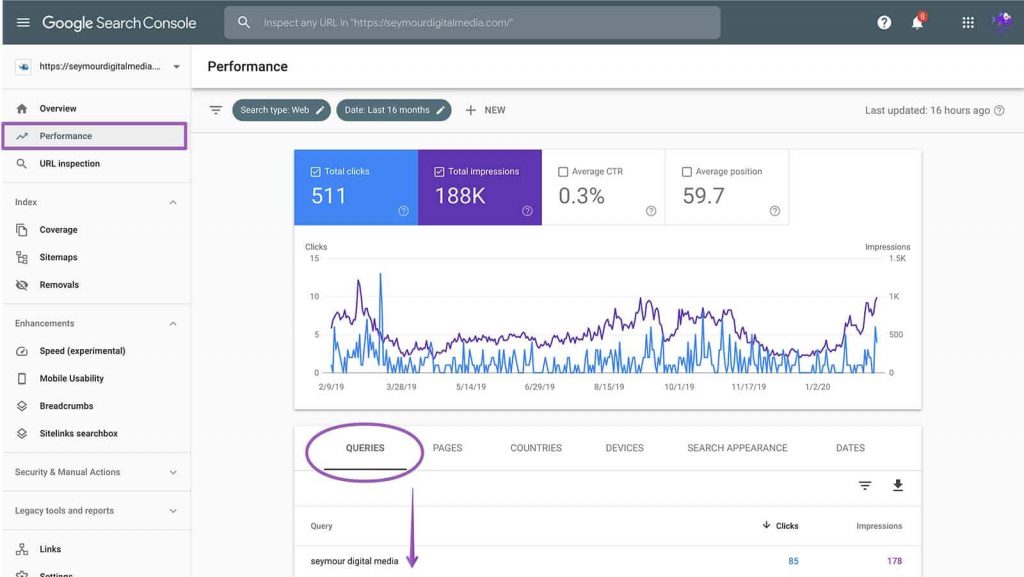
The Query report will show you all the keyword phrases your website has shown up for in Google. Amazing right! Keyword strings that people have actually typed into google and you can see what your website showed and where. You can also click over to the page report (right beside the query report). Then click on a page, this will make the page a filter. Next click on the queries report tag (with the page as a filter) and you’ll see specific keywords that page is showing up for.
Now you can download these keypresses and add them to your keyword list. Side note, if you’re past keyword research and you’re optimizing pages this is a great strategic way to optimize already existing pages for the right keywords. Once you have a list of keywords and you’ve optimized your website and you have 1 phrase per page and you’ve optimized for that phrase over time you’ll actually see your page rank or go higher in the search engine results page for that specific keyword. It is pretty neat to see.
Step 5: Google My Business
I pull out Google My Business (GMB) from the additional tools because it gives you a lot of free information regarding keywords and what your website is showing up for. Search console is the best for this but never leave out Google My business if you’re a local business. It is a lot like Search console in that it is free Google resource and provides some really great information regarding your business and keywords
If you have Google my business you’d go to this page to sign in. If you don’t have Google My Business and you’re a local business go and get that right now! This is really important for your local business. Once you’re in there go and look at your insights. It isn’t hard to find. It is down the left-hand side menu. If you’ve had it set up for a while you should see some keywords in there.
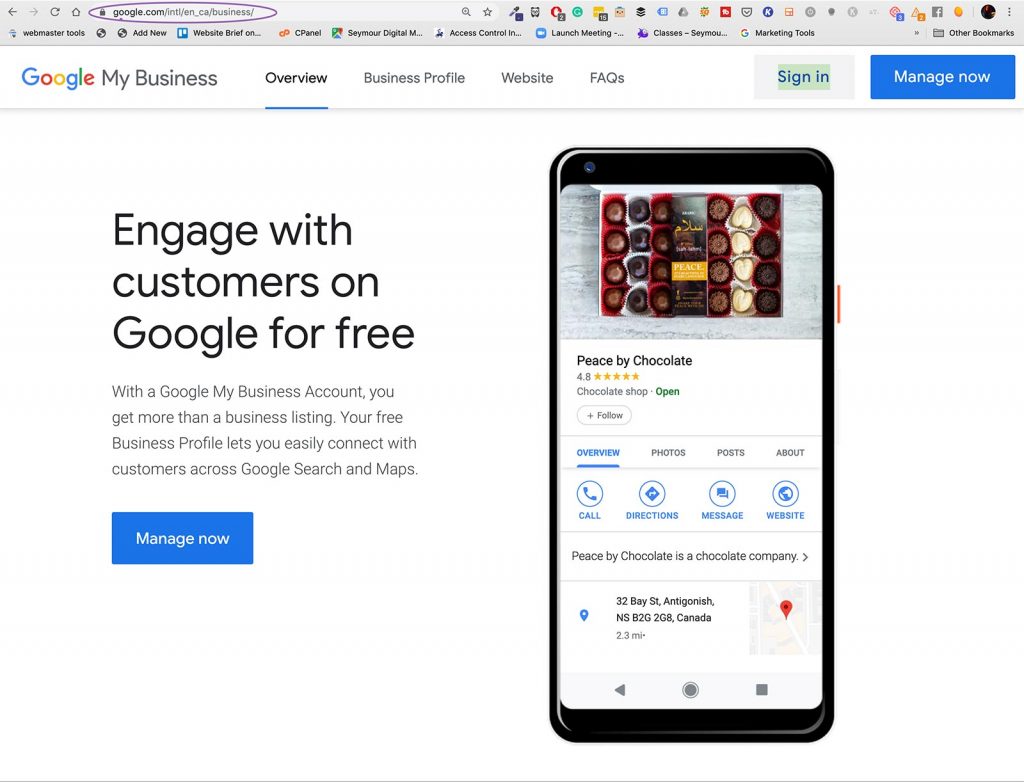
Step 6: Google Keyword Planner
The Keyword Planner. You can use this first, last and in the middle. It is quite versatile. This is a great testing tool. Now that you have your list.
Search via keywords, and type in a keyword. They’ll give you suggestions. Also, put in your website, and you’ll get it, and you’re looking. The most optimum keyword is going to be high volume and low competition.
If you haven’t used the keyword planner before, there is a secret way to sign in without creating a campaing (Google tries to get you to spend money right away, you don’t have time) Always look for the hyperlinked blue text in the screen when you’re in Google Ads. If you want more help on this feel free to ask me or check out my youtube videos.
Step 7: Google Trends
Now you’ve got your list. It is time to check some other things out. Remember, it is a creative process, in which every person does it their way in the end. It is time to test those keywords. Google Trends is a great place to look.
It will help you make the right decision. And you know what, you’re going to make the best decision 90% of the time. Research hashtags on Google or Instagram to find keywords that might be relevant to your business. There’s a lot of creativity involved in keyword research.
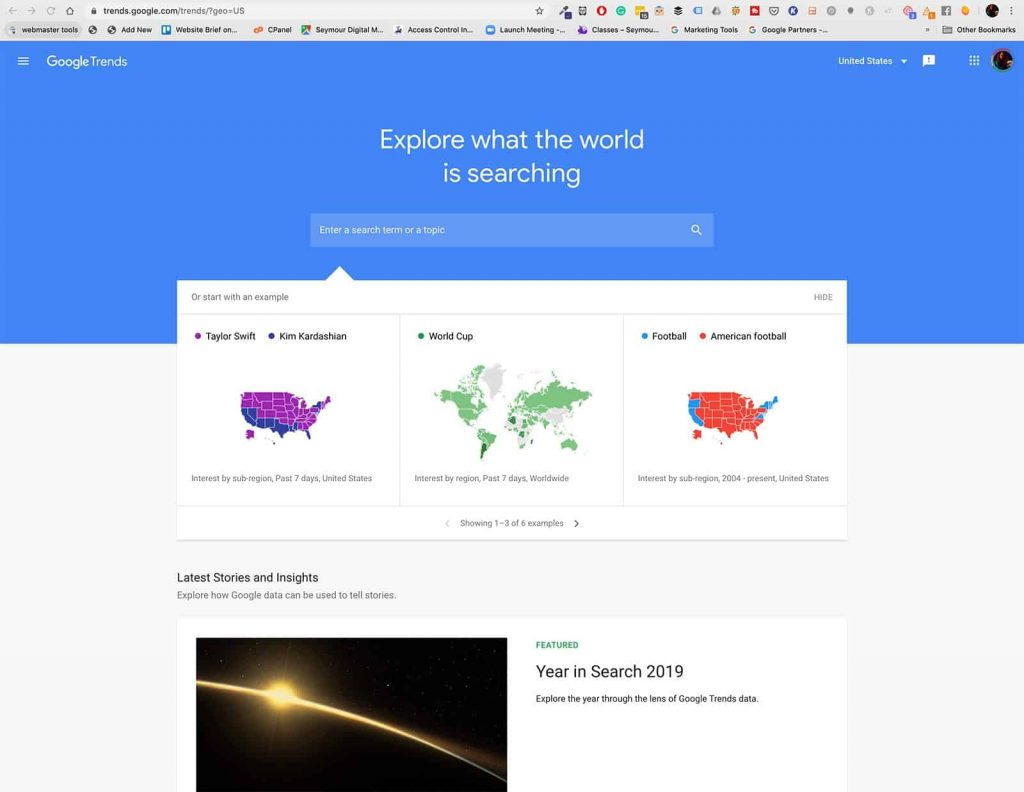
something that is maybe a little more fun about keyword research is using tools that allow you to see what competitors are using for keywords.
There are some out there to give you that information. You’re looking at and finding out what your competitors are using and then trying to use that to do better than them. It’s like a game checklist. Keywords are the cornerstone of your marketing.
Want Your Free Guide so you can refer to it anytime? Here it is

If you feel you are not there, like using keywords and keyword research is well ahead of you. You are not alone, and I am here to help. The fundamentals matter, and your confidence (and business) will soar online once you get them.

